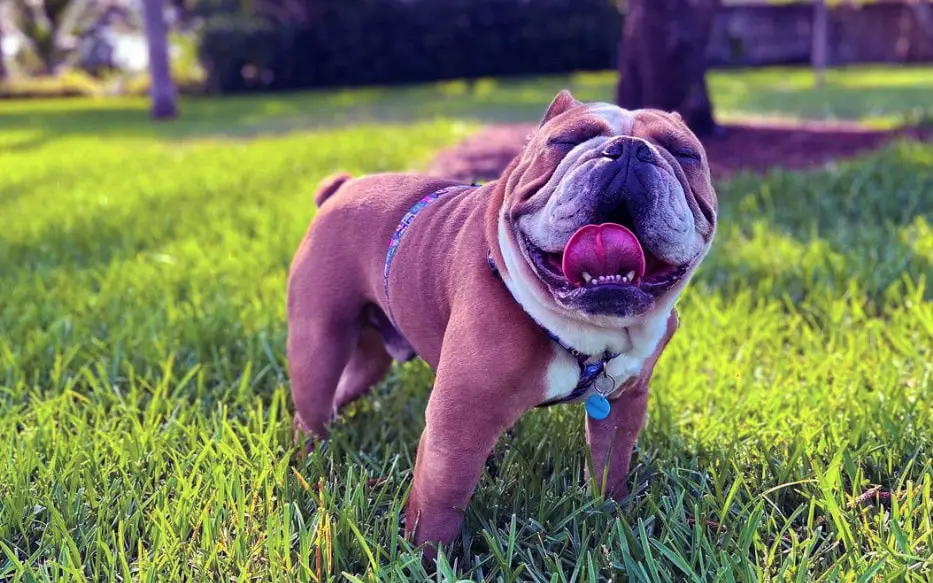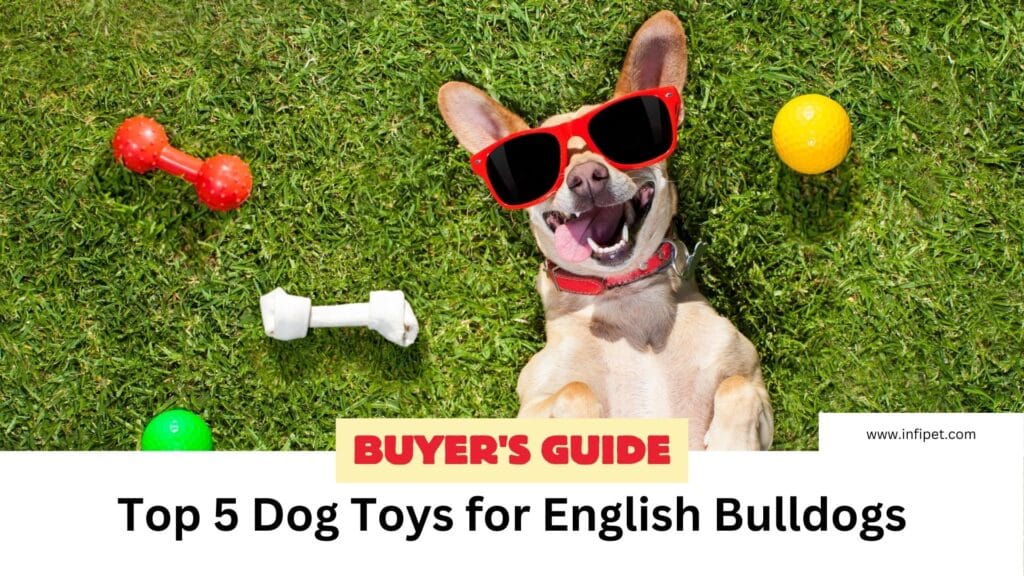Understanding why your English Bulldog is displaying aggressive behavior is crucial for ensuring the safety and happiness of both you and your pet. Bulldogs are known for their loyalty and affectionate nature, but various factors can lead to sudden aggression. This article explores potential causes and offers practical solutions to help you manage and mitigate this challenging behavior.
Table of contents
- Possessive Pooch: When Your Bulldog Won’t Share
- Health Check: Is Your Bulldog Feeling Ruff?
- Training Troubles: Did Your Bulldog Miss Obedience School?
- Overprotective Pup: When Loyalty Turns to Lunacy
- Bulldog Body Language: Reading the Signs Before the Bite
- Stress and Anxiety: The Hidden Culprits Behind Bulldog Aggression
- Professional Help: When to Call in the Experts
- Conclusion
- Frequently Asked Questions
- Why is my English Bulldog suddenly aggressive?
- How can I stop my Bulldog from being possessive of toys and food?
- When should I take my aggressive Bulldog to the vet?
- What are common health issues that cause aggression in Bulldogs?
- How important is early socialization for Bulldogs?
- What should I do if my Bulldog shows signs of overprotectiveness?
Possessive Pooch: When Your Bulldog Won’t Share
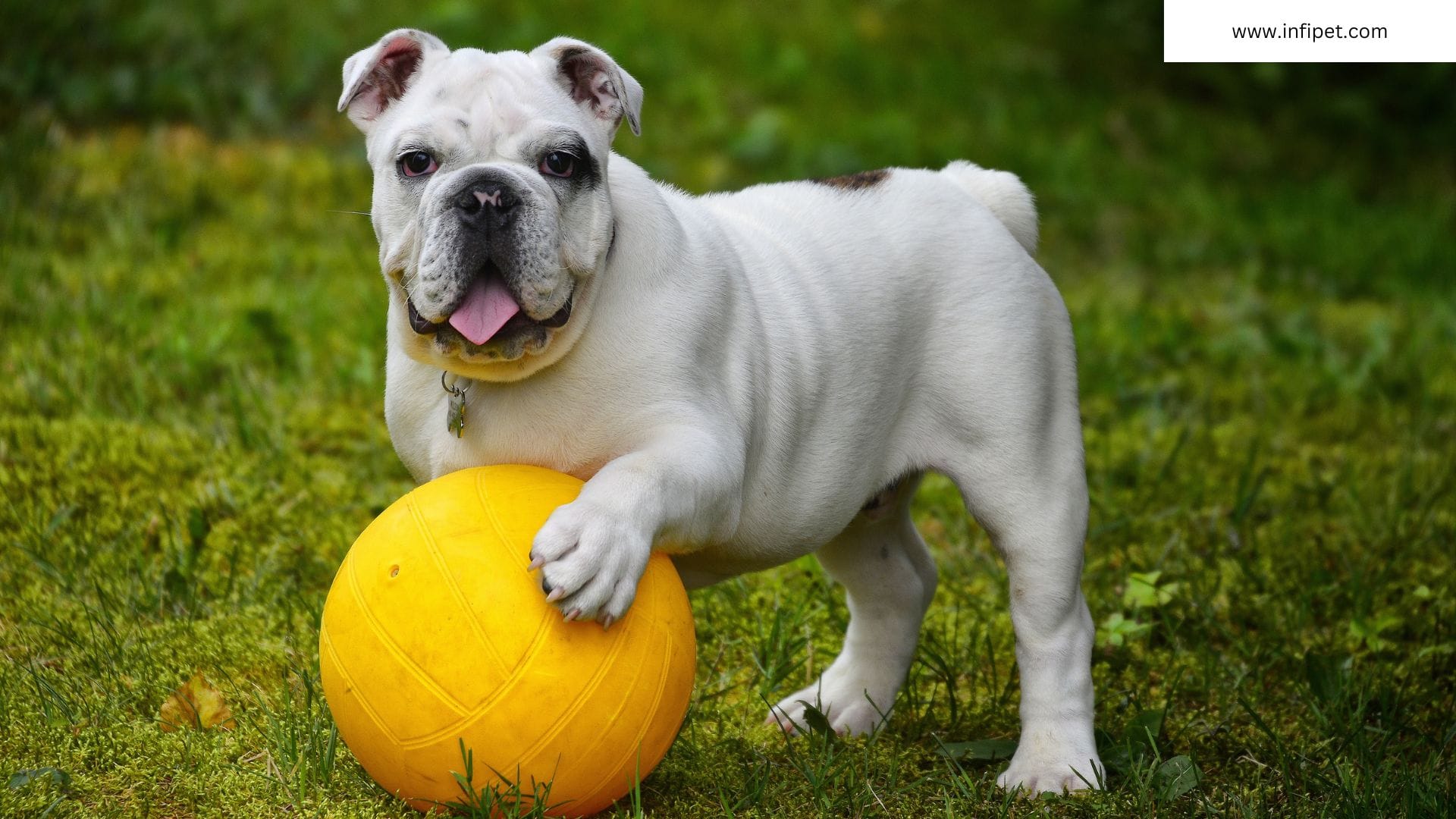
Guarding Toys Like They’re Gold
Ever tried to take a toy from your Bulldog? It’s like trying to steal treasure from a dragon! Bulldogs can be incredibly possessive of their toys, often growling or snapping if you get too close. This behavior is a classic sign of possessive aggression and can be traced back to their days in overcrowded shelters where they had to compete for resources. Bones and chew toys are particularly coveted items, so it’s best to keep an eye on your furry friend when these are around.
Food Bowl Fiascos
If your Bulldog turns into a snarling beast when you approach their food bowl, you’re not alone. Many Bulldogs exhibit possessive aggression around their food. This can be especially concerning if you have other pets or small children in the house. To mitigate this, try feeding your Bulldog in a separate room and avoid disturbing them during mealtime. Remember, a hangry Bulldog is not a happy Bulldog!
The Couch is Mine, Human!
Ever been kicked off your own couch by a four-legged family member? Bulldogs are known for their strong bonds with their owners and can become territorial over shared spaces like couches or beds. If your Bulldog starts growling or snapping when you try to reclaim your spot, it’s a sign they might be feeling a bit too possessive. To address this, establish clear boundaries and make sure your Bulldog has their own comfy space to relax.
Possessive aggression is easier to spot. It only occurs if a dog has something to feel possessive of, like food, treats, toys or a favorite person. If your dog growls or snaps at you when you approach their food bowl or try to take away a toy, this is a sign of possessive aggression. A reaction like this is common if a dog has had to compete for resources in the past, perhaps at an overcrowded shelter. Another cause might be the introduction of a new rival.
Health Check: Is Your Bulldog Feeling Ruff?
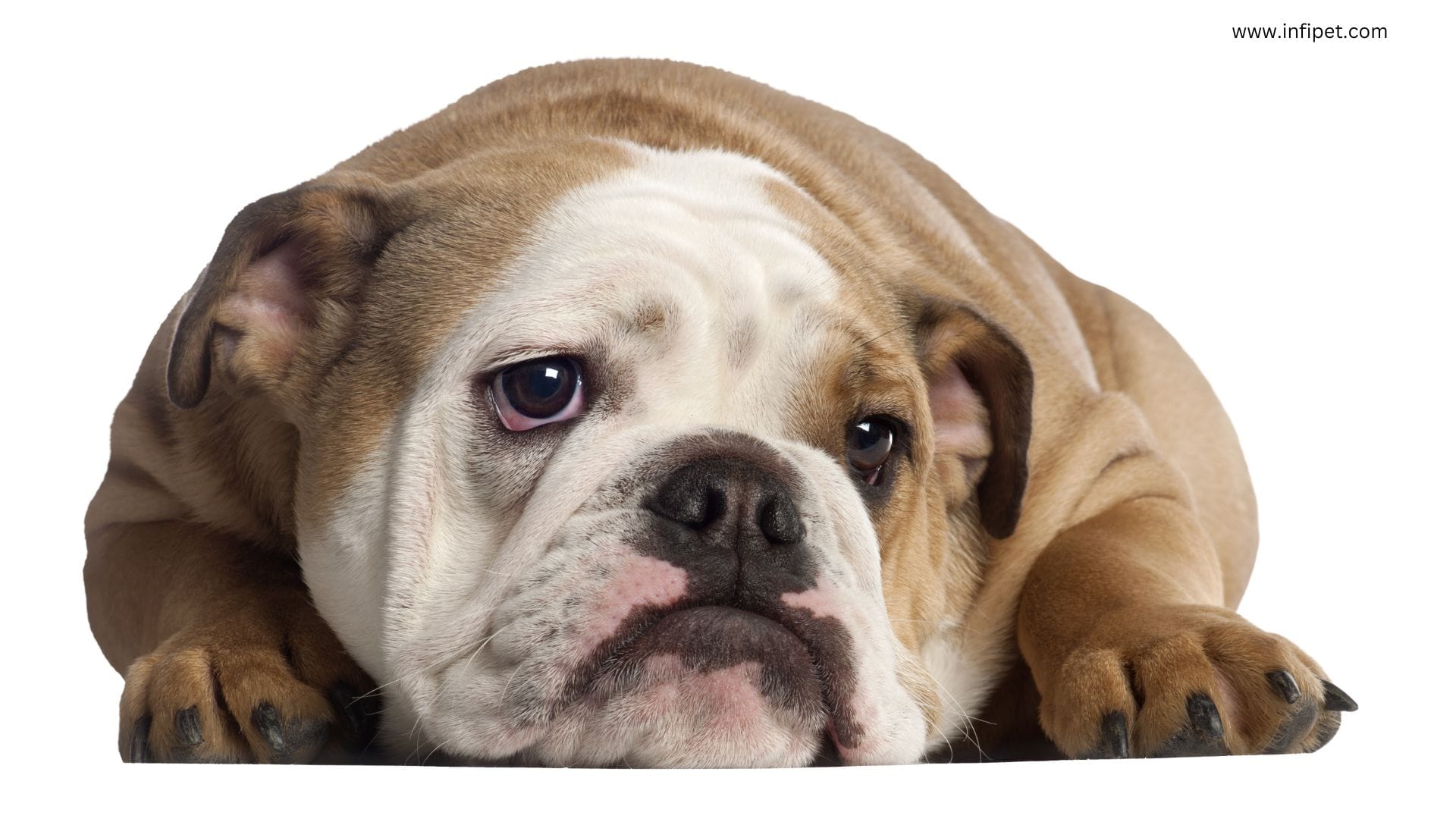
When your bulldog starts acting like a grumpy old man, it might be time for a health check. Common health issues can turn your cuddly companion into a bitey beast. From dental problems to arthritis, there are several health concerns that could be causing your bulldog’s aggression. If your bulldog is suddenly more aggressive, it’s crucial to rule out any underlying medical conditions.
Common Health Issues That Cause Aggression
Just like us, bulldogs can get cranky when they’re not feeling well. Some common health issues that might cause aggression include:
- Dental problems: A toothache can make anyone snappy.
- Arthritis: Joint pain can make your bulldog less tolerant of touch.
- Hypothyroidism: This condition can affect your bulldog’s mood and behavior.
- Skin infections: Itchy skin can make your bulldog irritable.
When to Visit the Vet
If your bulldog’s aggression seems out of character, it’s time to visit the vet. They will discuss your dog’s medical and behavioral history and perform a complete physical examination. Blood and urine tests may be necessary to assess your dog’s blood cell counts and organ function. Radiographs may also be needed to locate the source of the problem. Check with your vet to rule out any serious health issues.
Keeping Your Bulldog Healthy and Happy
Prevention is better than cure! Keep your bulldog healthy and happy by following these tips:
- Regular vet check-ups: Catch health issues before they become serious.
- Balanced diet: Ensure your bulldog is getting all the nutrients they need.
- Exercise: Keep your bulldog active to prevent obesity and related health issues.
- Dental care: Regular teeth cleaning can prevent dental problems.
Remember, a healthy bulldog is a happy bulldog. Keep an eye on their health to ensure they stay the loving and affectionate companion you know and love.
Training Troubles: Did Your Bulldog Miss Obedience School?
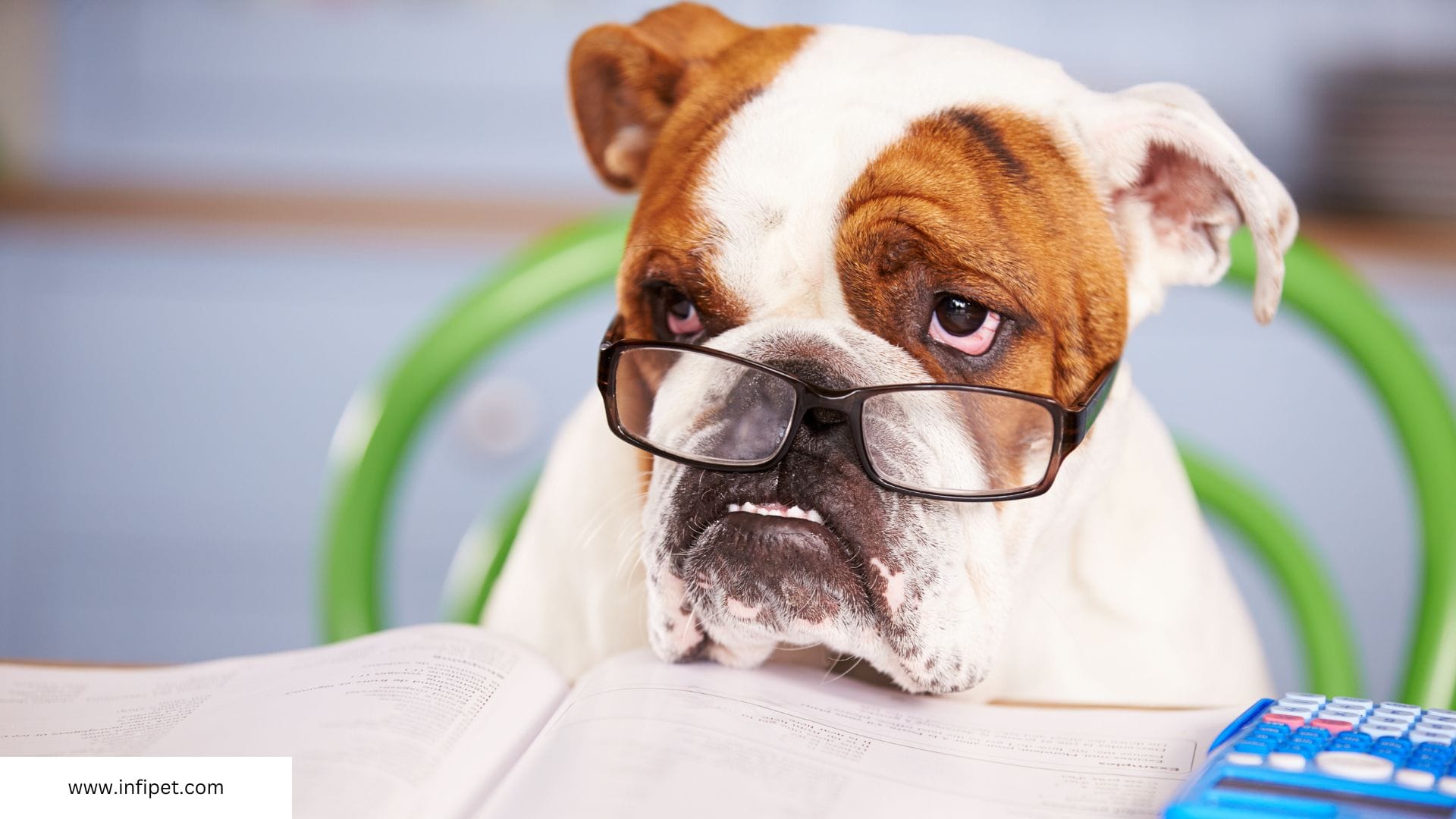
Training a Bulldog can sometimes feel like trying to teach a rock to fetch. But don’t worry, even if your Bulldog missed out on obedience school, there’s still hope!
The Importance of Early Socialization
Early socialization is crucial for Bulldogs. If a Bulldog has been improperly socialized, it is much more likely that he will bite as an adult. Although Bulldogs are completely gentle and calm with their owners, they tend to be wary of strangers and strange dogs. A good dog trainer will be able to socialize your young Bulldog and make him feel safe and comfortable around strange dogs and people.
Finding the Right Trainer
Finding the right trainer can be a game-changer. The issue may be tied into poor socialization, which is a much harder issue to tackle from a behavioral standpoint. It may be the personality or character of your specific Bulldog, or it may be that your Bulldog feels overprotective of you and your family. In any case, working with a trainer will help ensure that the behavior is curbed and redirected in a healthy way.
DIY Training Tips for Bulldog Owners
If you’re more of a DIY person, there are plenty of training tips you can try at home. This tactic will work even with adult dogs, although it may be difficult to break the behavior once it has been established in an adult Bulldog. If you find that you are having issues with biting in your adult Bulldog, you may want to seek out behavioral training. The issue may be tied into poor socialization, which is a much harder issue to tackle from a behavioral standpoint.
Bold: Training a Bulldog can sometimes feel like trying to teach a rock to fetch. Italics: If a Bulldog has been improperly socialized, it is much more likely that he will bite as an adult. Highlight 1: If a Bulldog has been improperly socialized, it is much more likely that he will bite as an adult. Highlight 2: The issue may be tied into poor socialization, which is a much harder issue to tackle from a behavioral standpoint. Highlight 3: If you find that you are having issues with biting in your adult Bulldog, you may want to seek out behavioral training.
Overprotective Pup: When Loyalty Turns to Lunacy
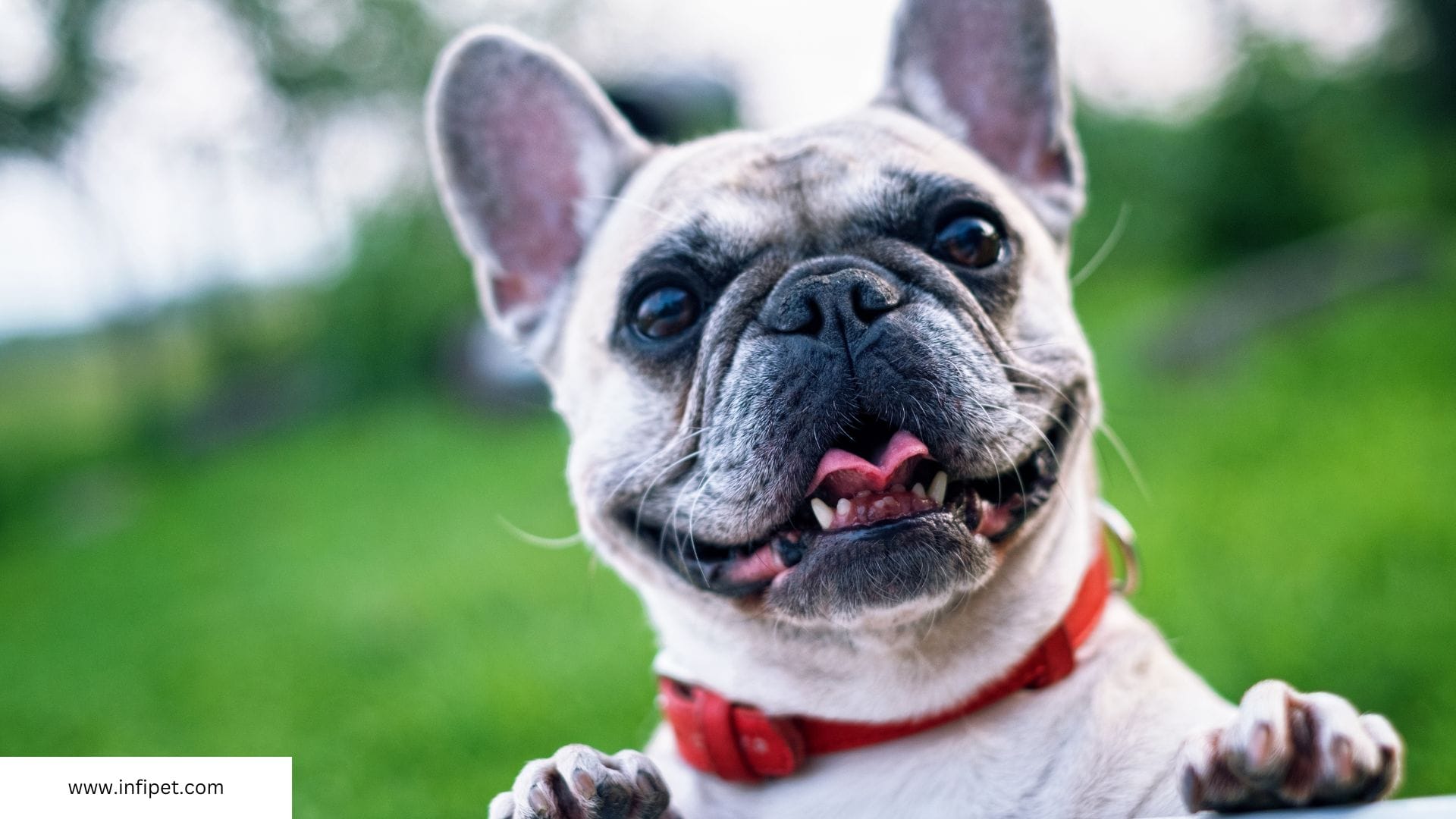
Bulldogs are known for their loyalty, but sometimes that loyalty can go a bit overboard. When your bulldog starts acting like a furry bodyguard, it can be both endearing and a little terrifying. Understanding why your bulldog is so protective is the first step in addressing the issue. Often, this behavior stems from a place of insecurity or fear, which can be exacerbated by changes in their environment or routine.
Understanding Bulldog Loyalty
Bulldogs are naturally protective of their families. This trait, while usually positive, can sometimes lead to overprotective behaviors. When a bulldog perceives a threat, whether real or imagined, they can become aggressive in their attempts to protect their loved ones. This feeling of threat may be generalized as a perceived threat to the whole family or “pack”, it begins with the dog itself feeling insecure or afraid.
Signs Your Bulldog is Overprotective
Recognizing the signs of an overprotective bulldog is crucial. These can include growling, snapping, or even biting when someone approaches you or another family member. They might also become overly attached, following you everywhere and becoming anxious when you’re out of sight. If your bulldog is acting out due to diet, psychological issues, and sudden environment changes, it’s important to address these underlying causes.
How to Calm an Overprotective Bulldog
Calming an overprotective bulldog involves a combination of training, reassurance, and sometimes professional help. Start by creating a calm environment and establishing a routine that makes your bulldog feel secure. Training sessions that focus on socialization and obedience can also be beneficial. If the behavior persists, consulting a canine behavior specialist might be necessary. Remember, possessive aggression in dogs is a serious problem for dog owners and a common reason that dogs are referred to animal behavioral specialists.
“He just wants to protect me…” This sentiment is common among bulldog owners dealing with overprotective behaviors. While it’s heartwarming to know your dog cares so much, it’s essential to address these behaviors to ensure a happy and safe home for everyone.
Bulldog Body Language: Reading the Signs Before the Bite
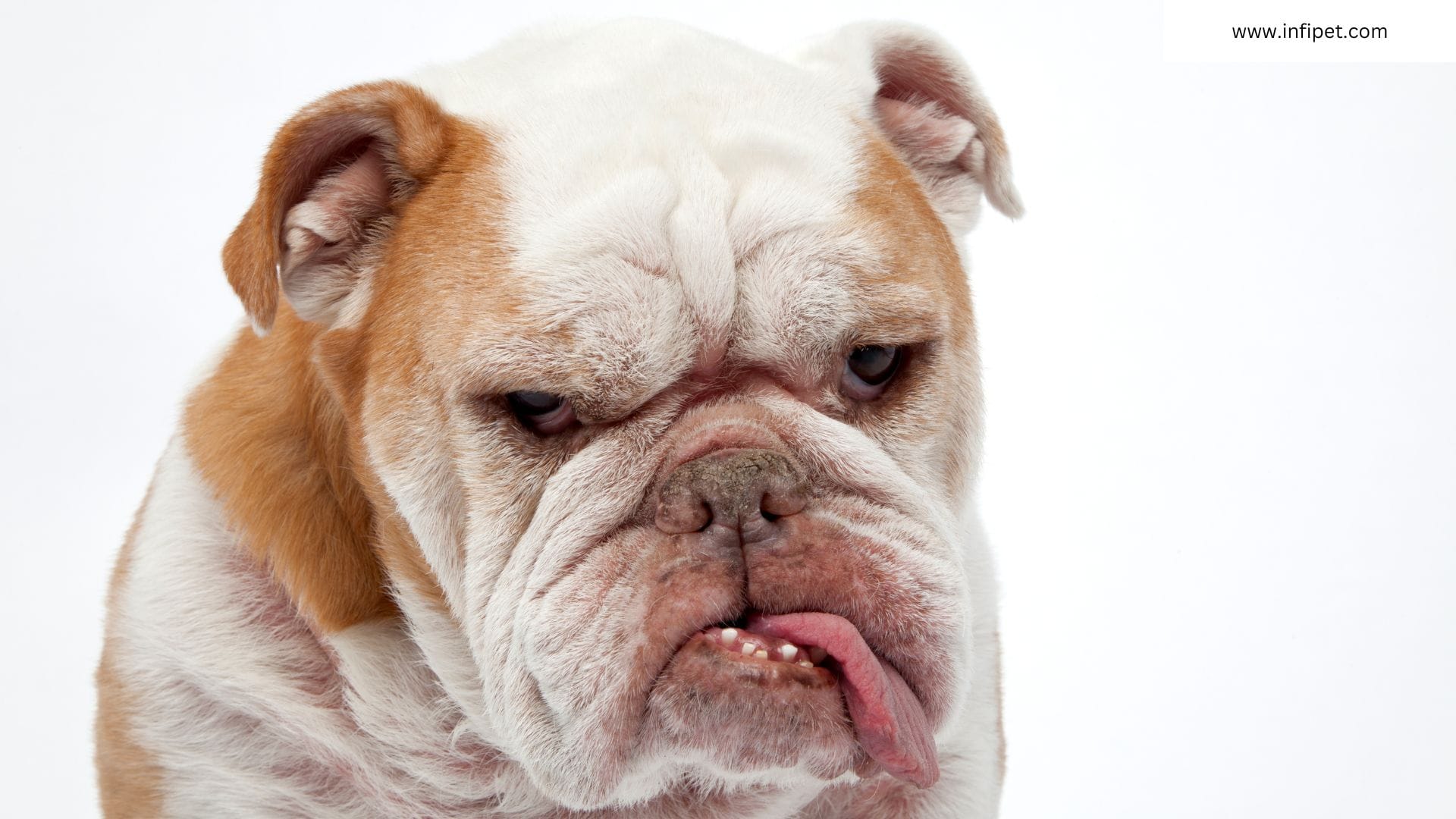
Understanding your Bulldog’s body language can be the difference between a peaceful evening and a trip to the ER. Bulldogs, like all dogs, have their own way of communicating their feelings, and it’s up to us to read the signs before things get out of hand.
Stress and Anxiety: The Hidden Culprits Behind Bulldog Aggression
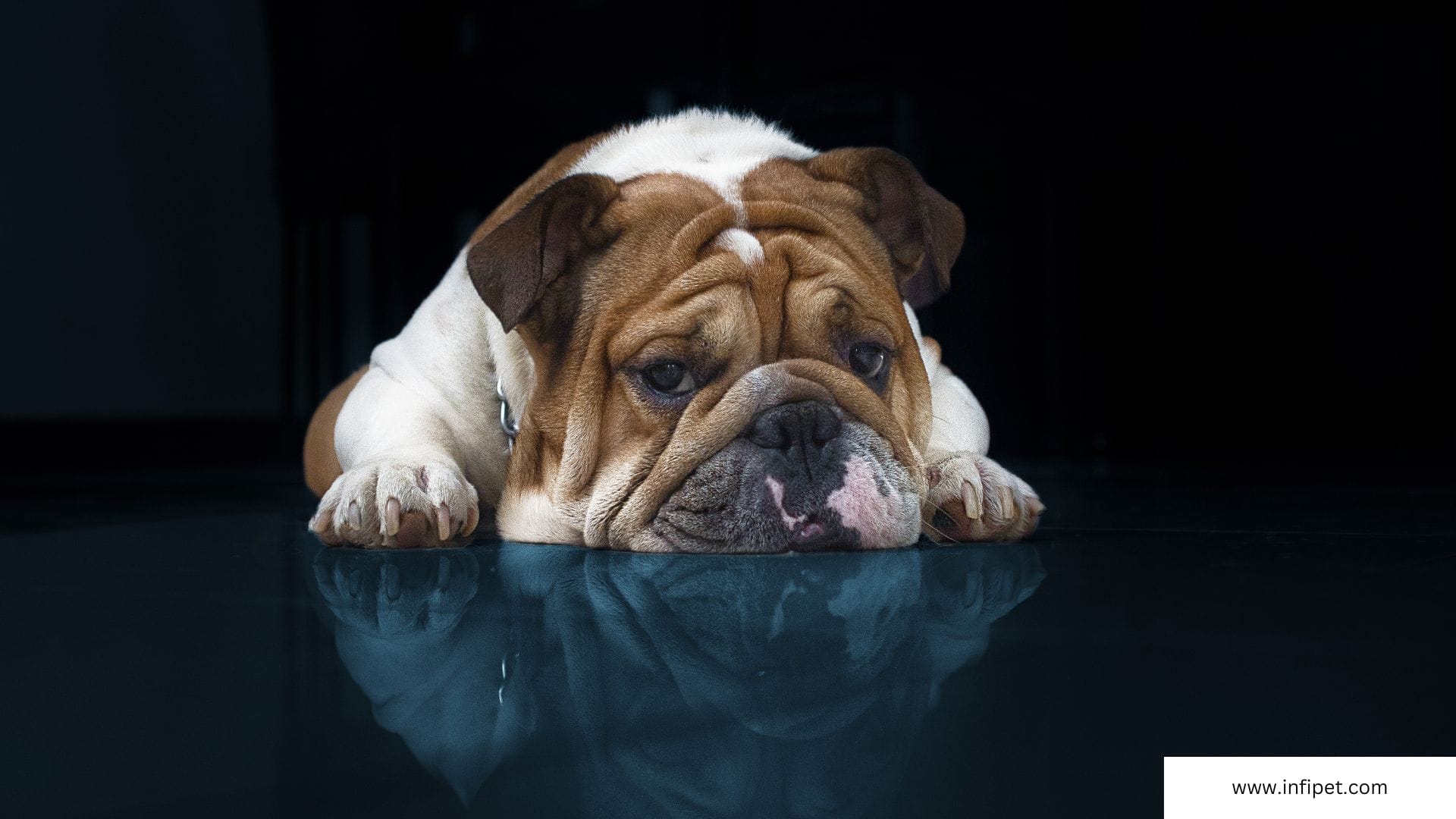
Stress and anxiety can turn your sweet Bulldog into a growling, snapping furball of fury. Identifying the triggers is the first step to a calmer, happier pooch. From separation anxiety to changes in the home, these stressors can make your Bulldog feel like the world is ending.
Identifying Stress Triggers
Your Bulldog might be acting out because of social changes within the home or even separation anxiety. If your Bulldog is suddenly aggressive, it might be time to play detective and figure out what’s causing the stress.
Creating a Calm Environment
Creating a serene space for your Bulldog can work wonders. Think of it as a doggy spa day, every day. Soft beds, calming music, and a consistent routine can help ease their anxiety.
Stress-Relief Techniques for Bulldogs
When it comes to stress relief, Bulldogs are no different from us. They need their version of yoga and meditation. Here are some techniques:
- Exercise: A tired Bulldog is a happy Bulldog.
- Mental Stimulation: Puzzle toys can keep their minds occupied.
- Massage: Yes, doggy massages are a thing and they love it!
Remember, a calm Bulldog is a happy Bulldog. Addressing their stress and anxiety can turn your growling gremlin back into the lovable lump you adore.
Professional Help: When to Call in the Experts
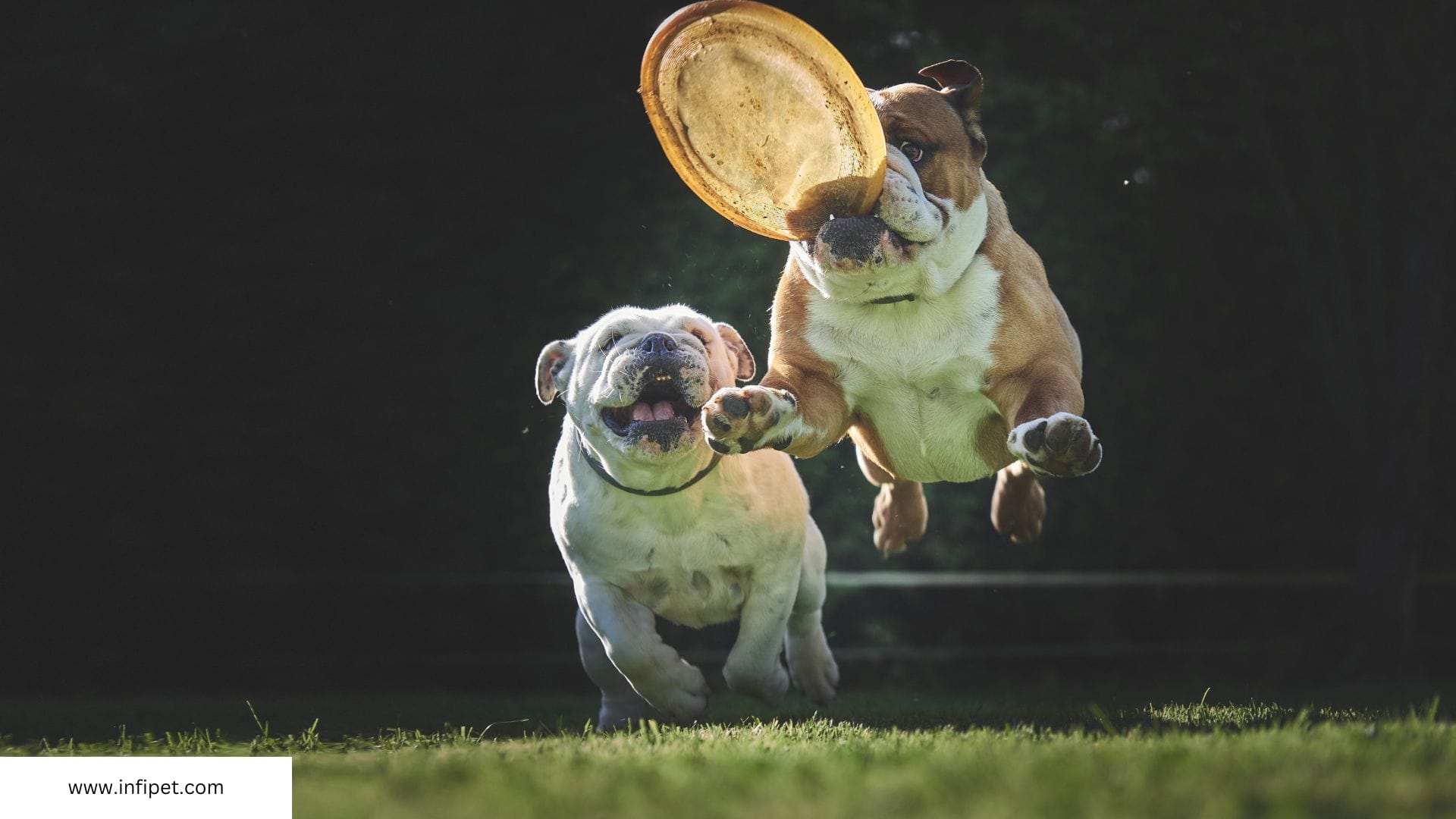
When your bulldog’s behavior has you feeling like you’re living with a tiny, furry tornado, it might be time to call in the pros. Aggression is a serious issue that shouldn’t be ignored, especially if it could lead to someone getting hurt. Here’s when to seek professional help and what to expect.
Types of Canine Behavior Specialists
There are several types of specialists who can help you and your bulldog live in harmony:
- Certified Canine Behaviorist: These experts use techniques like behavior modification, conditioning, and desensitization to address aggressive behaviors.
- Positive Dog Trainer/Behavior Consultant: They focus on reinforcing good behavior and can help you document and manage your dog’s triggers.
What to Expect from Professional Training
When you work with a professional, you can expect a thorough assessment of your bulldog’s behavior. They’ll help you identify specific triggers and create a customized training plan. This might include:
- Behavior modification techniques
- Conditioning exercises
- Desensitization strategies
Success Stories: Bulldogs Who Turned Over a New Leaf
Believe it or not, many bulldogs have gone from being little terrors to well-behaved companions thanks to professional help. These success stories often involve a combination of expert guidance and dedicated owner participation. So, don’t lose hope—your bulldog can change for the better!
If reinforcing limits with an aggressive dog causes the aggression to escalate, it’s time to work with a professional for dog behavior training, preferably a certified canine behaviorist.
Conclusion
In conclusion, while your English Bulldog’s sudden bouts of aggression may be as confusing as trying to understand Shakespeare after a few too many drinks, there are clear steps you can take to address the issue. Start by ruling out any health problems—because even the toughest Bulldogs can have a bad day. Then, seek professional help to pinpoint the cause and work on a solution. Remember, your Bulldog isn’t plotting world domination; they’re just trying to communicate in their own, sometimes toothy, way. With patience, love, and a bit of humor, you can turn those growls into grins.
Frequently Asked Questions
Why is my English Bulldog suddenly aggressive?
Sudden aggression in Bulldogs can be due to various reasons including health issues, poor socialization, or feeling overprotective. It’s essential to rule out health problems first and then work with a professional to pinpoint the cause.
How can I stop my Bulldog from being possessive of toys and food?
Possessive aggression can be managed through consistent training and establishing clear boundaries. Working with a professional trainer can also help redirect this behavior in a healthy way.
When should I take my aggressive Bulldog to the vet?
If your Bulldog’s aggression is sudden and unexplained, it’s crucial to visit the vet immediately to rule out any underlying health issues that might be causing the behavior.
What are common health issues that cause aggression in Bulldogs?
Common health issues that can lead to aggression include pain, neurological problems, and hormonal imbalances. Regular vet check-ups can help detect and manage these issues early.
How important is early socialization for Bulldogs?
Early socialization is critical for Bulldogs as it helps them learn how to interact with other dogs and humans, reducing the likelihood of aggressive behavior later in life.
What should I do if my Bulldog shows signs of overprotectiveness?
If your Bulldog is overprotective, it’s important to establish yourself as the leader through consistent training. Consulting a professional trainer can also provide strategies to manage and reduce this behavior.


